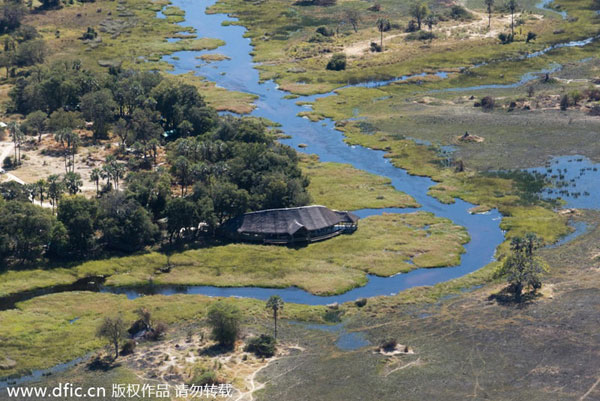The Natural Jewels in Africa's Crown
 |
|
Aerial views of the Okavango Delta in Botswana.[Photo/IC] |
IT is impossible to look out over the winding waterways and lush green wetlands of the magnificent Okavango Delta and fail to understand the importance of conserving the natural world.
A World Heritage Site teeming with plants, fish, birds and home to some of the planet's most endangered animals, the delta is one of Botswana's – and Africa's – most impressive natural jewels.
It is clear that the world has a moral obligation to save areas of wild beauty like these: the planet would be poorer without them.
But it's not only about saving nature for nature's sake. It is also about recognising that the natural world, when looked after correctly, can contribute immensely in tackling some of the most critical problems facing humanity, from hunger to poverty, disease to climate change.
Here, in Sub Saharan Africa, more than 70 per cent of people depend on forests and woodlands for a living. Ecosystems like the Okavango Delta play a key role in Botswana's economy, providing livelihoods for herders, farmers and fishermen alike in addition to the revenue accrued from tourism.
If we are to advance some of humanity's highest ideals, then we need to improve the way we manage these vital ecosystems and sustainably harness the essential resources they provide us with.
Nowhere is the need for this greater than here in Africa. Reducing poverty, creating jobs, combatting climate change, ending hunger and driving sustainable economic growth on the continent – goals set out in the 2030 Agenda for Sustainable Development – will require trillions of dollars at a time when international financial assistance to Africa is on the decline.
But, despite the daunting costs involved, the potential for real transformation is there. Africa holds 30 per cent of the world's mineral reserves, roughly 65 per cent of its arable land and 10 per cent of its internal renewable fresh water sources. Its fisheries are estimated to be worth $24 billion and the continent boasts the second largest tropical forest in the world. These are just some of the resources that make up Africa's vast reserves of natural capital – the environmental assets that, if managed properly, could drive the continent's transformation.
But simply extracting these resources will not be enough to bring long-lasting change. If current population and consumption trends continue, humanity will need the equivalent of two Earths to support itself by 2030. This is clearly not viable in a world where climate change will make it even harder for the natural world to provide for our basic needs.
So, instead of simply extracting natural resources and exploiting natural capital we need to start managing them sustainably. The economic incentives for this are compelling. Africa alone could save as much as $103 billion every year by harnessing its natural capital in a sustainable way – money that could then be pumped back into alleviating poverty, providing access to clean energy and improving education and health.



























